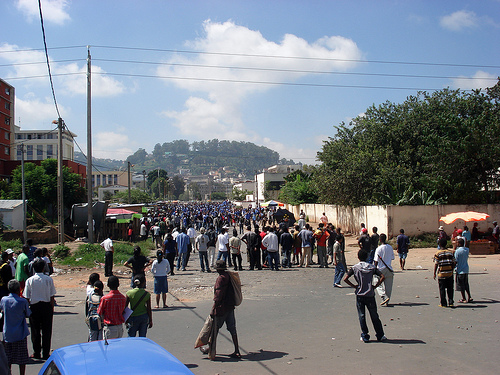
Following the deaths of around a hundred people in southern Madagascar in clashes between zebu cattle rustlers (“dahalo”) and farmers, the government has decided to take special security measures to restore order. The violence is a symptom of the growing political instability in Madagascar that is affecting urban centers as well as rural communities.
People’s Justice in the South
Thefts and armed attacks are a recurring problem in Madagascar and have been growing more and more frequent since the political crisis in 2009. To overcome this problem, a national counter-instability plan [fr] was formally introduced in April 2012. The government has now mobilized the armed forces in the capital as well as in areas particularly affected by cattle theft.
However, initial attempts at stabilizing the southern region were far from successful. As Alain Rajaonarivony explains [fr]:
The military campaign carried out against the dahalo in the bush of the great south in June and July 2012 was a disaster. Not only were they more familiar with the local terrain, the dahalo were also just as well equipped as the government forces – and the lack of helicopters was sorely felt by the latter. The government forces were especially noted not for their combat ability but for their atrocities, when they burnt villages that could serve as support bases for the dahalo.
Faced with the inability of government forces to curb the actions of dahalos, villagers in southern Madagascar have decided to take justice into their own hands. Recently, a group of villagers killed 67 people that they suspected of being involved in the cattle thefts.
Alain Iloniain on AllAfrica describes the additional security measures [fr] taken by the government following these tit-for-tat encounters, including mobilizing several elements of the armed forces in different parts of the country. However, before there can be order, it will be necessary to identify and apprehend and convict the dahalo. Citoyenne Malgache, a popular Madagscar blogger, explains why this will not be an easy task [fr]:
Self-defense or not, the real question is who should we be defending ourselves against? As Dinan’Anosy mentioned, thieves are part of the community and are known to the population. But the thefts are often organized by underground smuggling networks. Those with large herds collaborate with the robbers one way or another to protect their own flock. And even if fokonolona is able to locate the stolen cattle, those who are then charged with having received them are quickly released. With the recent resumption – after 10 years of prohibition – of live cattle exports, you have to expect an increase in organized crime.
One person in particular seems to epitomize the ineffectiveness of the actions taken against the dahalo to date. A man named Remenabila has achieved a quasi-mythical status[fr] through his ability to escape government authorities. He is more than 70 years old and has been wanted by the police since June. There is even a €35,000 bounty on his head “dead or alive”. But nobody has yet dared to arrest him, leading to suspicion that he is protected by senior political officials.
Widespread instability
The south is not the only region living under the specter of instability. Foreign embassies are alerting their expatriate nationals about thefts, physical attacks, robberies or even kidnappings. While many crimes seem to be targeted at foreigners, the criminals are not as easy to identify.
On Madagascar TV, Marc A. notes the surprising circumstances [fr] of one theft at Ivato airport where a Chinese national claimed 4,000 Euros were stolen from her luggage while she was frisked by security personnel. None of the guards were apprehended for the theft after a senior security official intervened.
The rest of the country has not been spared according to analysis on Afrik.com [fr]:
A week does not go by without more stories, in newspapers, about violence in the capital, Antananarivo. All segments of the population, from the most to the least privileged, are victims of this scourge. Murder, assault, armed robbery have been commonplace in the last three years.
So what answers might there be to this instability? Andry Rajoelina, President of the Transitional Authority since Madagascar’s former president was ousted in 2009, has made claims that the daholo problem in the south is an orchestrated attempt at political destabilization [fr]. Meanwhile, Mathieu Pellerin, a researcher at the French Institute for International Relations, believes that financial incentives take precedence over political interests:
While possession of a zebu is traditionally synonymous with power, zebu theft by politician-sponsored organized gangs is motivated by pecuniary interests arising from the resale and export of cattle.
For further information on the topic, please view the following publications from our partners:
Under the Radar: the Crisis in Madagascar
UN Mediation and the Politics of Transition after Constitutional Crises
Madagascar : Sortir du cycle de crises
For more information on issues and events that shape our world please visit the ISN’s Security Watch and Editorial Plan.

